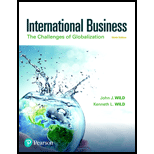
To Determine:
Mention the products which will not be available after other nations have cut off trades.
Answer to Problem 1TAI1
Solution:
When the countries in the world abruptly quit exchanging with each other, then it might make an extraordinary issue between the two nations.
Given: A condition when the trade with various countries is cut-off
Explanation of Solution
Cutting-off trades would make an absence of merchandise, which are fundamental for a few nations or its kin. It would likewise cause inflation in the cost of local items, which will lessen the
The cut-off exchange between the U.S.A. and different nations would cause the inaccessibility of different items. The cut-off exchange with Chile and Brazil would cause the inaccessibility of tea, espresso, new organic products, vegetables, a few flavors, dried natural products and so on as these are foreign made products from Chile and Brazil. In the state of a stop in exchange by every nation, it would take out the accessibility of German Lagers, outside extravagance autos. For example: Ferrari, Jaguar, and so forth.
The majority of the electronic advances and types of gear are bought from Japan and China. The sudden cut in the exchange with both the nations would lessen the accessibility of different electronic brand things and the general population of the U.S.A. needs to live without them. A large portion of the extravagance items and administrations are foreign in the U.S.A. as opposed to assembling and on the off-chance that the U.S. stops exchange with every nation then these extravagance things won't be accessible for the general population of U.S.A.
A developing country mostly depends on imports of various kinds of product. Once the trades are stopped, it creates difficulties for the country to cope up with these kinds of situation and sometimes the condition may get out of control.
Want to see more full solutions like this?
Chapter 5 Solutions
International Business: The Challenges of Globalization (9th Edition) (What's New in Management)
- Digital advertising is all those paid dissemination, promotion, and communication techniques of a company or brand that are launched in the digital environment. The Internet makes different types of channels and platforms available to us that help us reach our potential audience. Digital advertising is a tool for promoting and disseminating goods and services through the Internet. Digital advertising is part of the digital marketing strategies, which are a large part of the total strategies made for virtual media. There are different digital advertising types: Paid media Organic media Briefly explain each of the paid and organic media, add examples, and select the one you consider works best, and why it is the best for you.arrow_forwardhere are the requirements, and the formatting of the closing journal entry. I have done everything i just need to do the closing journal, please ensure its done correctlyarrow_forwardneed help this questionarrow_forward
 BUSN 11 Introduction to Business Student EditionBusinessISBN:9781337407137Author:KellyPublisher:Cengage Learning
BUSN 11 Introduction to Business Student EditionBusinessISBN:9781337407137Author:KellyPublisher:Cengage Learning Essentials of Business Communication (MindTap Cou...BusinessISBN:9781337386494Author:Mary Ellen Guffey, Dana LoewyPublisher:Cengage Learning
Essentials of Business Communication (MindTap Cou...BusinessISBN:9781337386494Author:Mary Ellen Guffey, Dana LoewyPublisher:Cengage Learning Accounting Information Systems (14th Edition)BusinessISBN:9780134474021Author:Marshall B. Romney, Paul J. SteinbartPublisher:PEARSON
Accounting Information Systems (14th Edition)BusinessISBN:9780134474021Author:Marshall B. Romney, Paul J. SteinbartPublisher:PEARSON
 International Business: Competing in the Global M...BusinessISBN:9781259929441Author:Charles W. L. Hill Dr, G. Tomas M. HultPublisher:McGraw-Hill Education
International Business: Competing in the Global M...BusinessISBN:9781259929441Author:Charles W. L. Hill Dr, G. Tomas M. HultPublisher:McGraw-Hill Education





